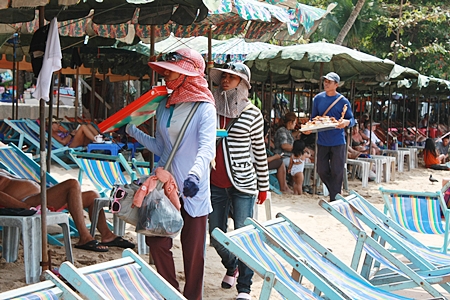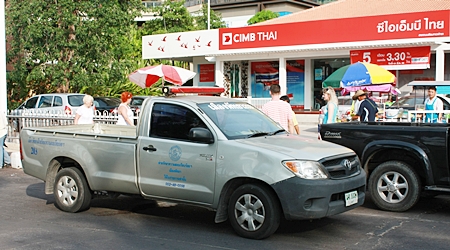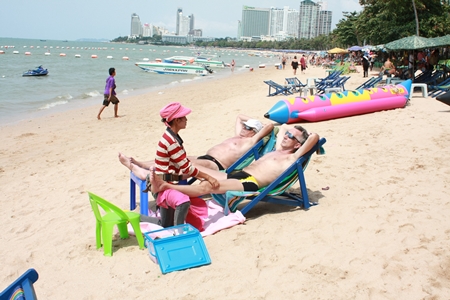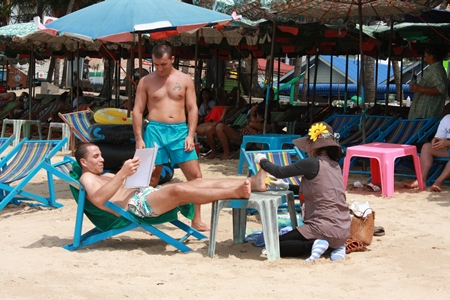Being pestered to buy everything from DVDs and food to sunglasses and sex toys is as common as sand and sun on Pattaya Beach. And while plenty of tourists complain about harassment from illegal vendors, the head of city hall’s regulatory-enforcement officers says his department is simply too understaffed to do anything about it.
“I haven’t been sitting idly by. I send officers daily to the beach to fine vendors,” said Maj. Col. Jeerawat Sukhonzup, head of enforcement for Municipal District 2, which covers the shoreline from North Pattaya to Thepprasit Road. With only 10 officers on shift at a time, however, there’s no way to regulate the hundreds of vendors hawking food and wares on the beachfront, he said.
 Vendors try to sell their wares to tourists on the beach.
Vendors try to sell their wares to tourists on the beach.
The Public Cleanliness and Orderliness Maintenance Act of 1992 actually gives law enforcement sweeping powers to make sunbathing and swimming in Pattaya a clean and hassle-free experience. The law, on paper, outlaws selling food without a license, using motorized carts to sell food, selling clothing and even spitting. The reality, however, is that most offenders have little fear of facing any real penalty.
Jeerawat said one reason for that is that illegal vendors only face fines, not arrest, for breaking the law. And most vendors, he said, find it cheaper to simply pay the fine, retrieve any confiscated goods and go back to their illegal ways rather than pay for a license or set up a proper shop.
 Municipal District 2’s patrol car, looking for law breakers along the beach front.
Municipal District 2’s patrol car, looking for law breakers along the beach front.
Fines, on paper, can actually be as much as 2,000 baht. But, again, in reality, they’re usually much less, with critics alleging the few hundred baht they pay goes not to the city, but to the officer extracting it.
“I am aware municipal officers are viewed in a bad light and poor vendors look upon them as black-hearted bullies,” Jeerawat said. “Few people realize, however, they are working hard because they are under a lot of pressure. If they do not fine the vendors, they are seen as irresponsible.”
Jeerawat said other reasons the outlaw-vendor problem persists are that the sellers have few other options to earn money and because tourists continue to buy from them.
Enforcement is an around-the-clock job. Municipal District 2 employs officers in three shifts each day. Each officer gets two days a week off. While working, they write less than 40 tickets a day on average, about 5,200 per year.
To write those tickets, they often have to chase down vendors who may even physically assault them, Jeerawat said. Tourists seeing such antics walk away with a bad impression of Pattaya, he said.
Ampin Maneewong, who sells herbs along the beachfront, said she constantly is afraid of being caught. But after her Lampang farm was damaged by cold weather, she had little choice but to come to the big city. “Getting caught is still better than starving back at home,” she said.
Another 56-year-old woman selling flowers agreed. Her Buriram farm was destroyed last year by flooding. “I have to work in Pattaya because it’s better than being at home without a job.”







